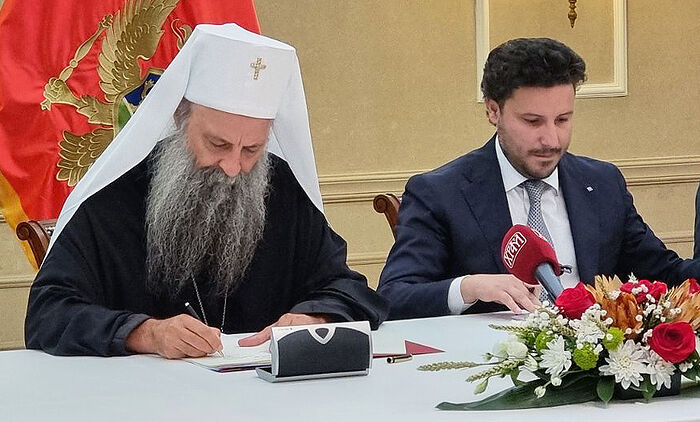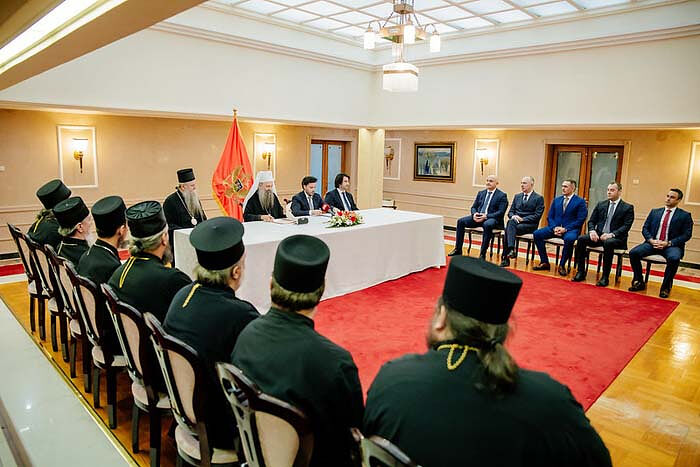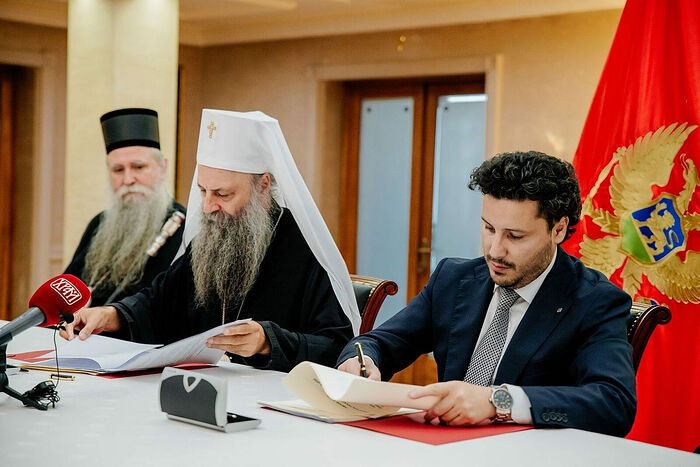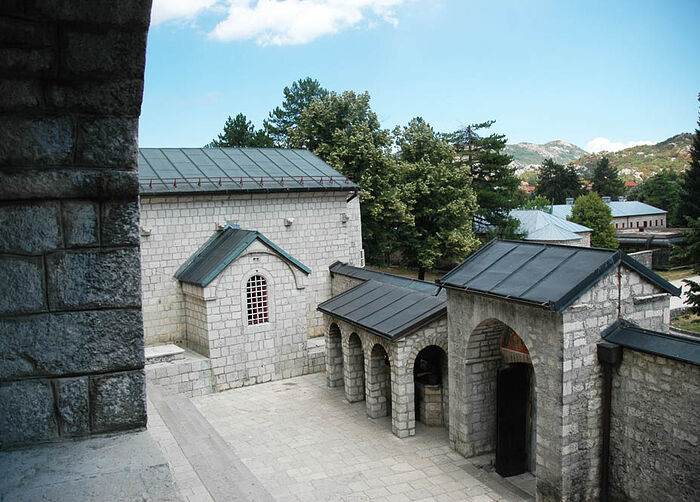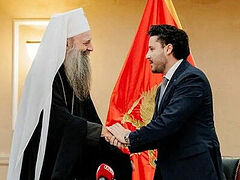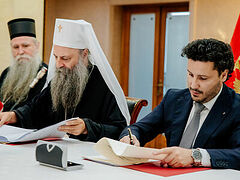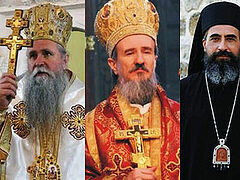The author, Hieromonk Ignaty (Shestakov), a brother of the Moscow Sretensky Monastery, is a Balkan studies specialist and fluent in the Serbian language.
In the beginning of August, the long-awaited signing of the Basic (or Fundamental) Agreement took place between the government of Montenegro and the Serbian Orthodox Church. The official ceremony was held in the morning of August 3 at the “Gorica” Villa not far from the Montenegrin capital.
Patriarch Porfirije of Serbia on behalf of the Serbian Church, and Dritan Abazović, the country’s Prime Minister on behalf of the government of Montenegro, have signed the agreement. The signing ceremony was attended by fairly large Church and government delegations. The members of the Holy Synod of the Serbian Orthodox Church were a part of the delegation, including Metropolitan Joanikije of Montenegro and the Littoral, Bishop Vasililije of Srem and Bishop Fotije of Zvornik-Tuzla; as well as all bishops whose dioceses are fully or partially located on the territory of Montenegro—Bishop Atanasije of Mileševa, Bishop Metodije of Budimlja-Niksic and Bishop Dimitrije of Zahumlje and Herzegovina. Archimandrite Nektarije, the Chief Secretary of the Holy Synod, and a few other clergymen were on a delegation.
On behalf of the government, the Minister of Justice Marko Kovač, who played a significant role in drafting the final document, arrived to the signing ceremony accompanied by the Deputy Prime Minister Vladimir Joković and ministers: Fatmir Gjeka of human and minority rights, Dragoslav Šćekić of health, and Aleksandar Damjanovic of finance.
Following the ceremony, Patriarch Porfirije thanked the members of the government and everyone who took part in drafting the text and as a result achieved the signing of the long-awaited document. He congratulated all the citizens of Montenegro irrespective of their faith and political or national identity. The Patriarch directed words of particular gratitude to Metropolitan Amfilohije of Montenegro and the Littoral of blessed memory, who made an enormous contribution to making this agreement a reality.
The official statements on the websites of the government and the Serbian Church, as well as other mass media are not likely to reflect the tension and charged atmosphere that surrounded the planning and decision-making process of signing of the agreement. As for the significance of its signing—it would be hard to find a more anticipated and discussed event in Montenegro over the last few years. The political struggles surrounding this document continued until the final moment, and they generally didn’t quiet down even after the agreement was signed.
The agreement’s significance
However, putting aside the political controversy and perennial turbulence of Montenegrin politics, it makes sense to elaborate the content side of the signed document in greater detail.
We must say at once that the Basic Agreement contains a set of statements positively affecting the future mission of the Church in Montenegro and generally regulating its legal status. Overall, the life of the Serbian Orthodox Church in Montenegro has a special distinction. On the one hand, the dioceses on its territory have been one of the most active in the Serbian Church. Beginning from the 1990s, the number of monastics and new churches is growing there, the high level of its publishing activity is noteable church-wide, and some of the prime church news media sources operate there. On the other hand, the hostile attitude of a number of leading politicians resulted in a situation where the activities of the Church were left practically unregulated on matters concerning its work in the army, the police force, detention centers, and health care facilities. The ownership of church property and holy places remains a painful issue, and there is no legal basis for teaching the foundations of faith in primary and secondary educational institutions, etc. Fundamentally, all key issues of church-state relations are stuck at level they were in the early 1990s: “Nothing is forbidden, but no one permits anything either.”
What is new?
As for the content of the document, it should be noted right away that the beginning of the agreement contains a truly important historical preamble that actually confirms the historical heritage and presence of the Serbian Church in Montenegro, and the historical link between all dioceses on the territory of modern Montenegro and the autocephalous Serbian Church. This issue is in fact extremely important, because over the course of many years, the political regime that remained in power and imposed pressure on the Church has constantly tried to advance the idea of a certain isolation of the Church on the territory of Montenegro from Serbian Church history, jurisdiction and cultural heritage. According to many, the Djukanovic regime would have lifted the pressure on the dioceses long ago, had they followed the path of seeking Church autonomy or some cultural and historical secession—as has been happening on the territory of Ukraine beginning in the 1990s.
By signing the Basic Agreement, the government recognizes “the contribution of the Serbian Orthodox Church in the social, cultural and educational development of Montenegro, the historical role of the Metropolitanate of Montenegro and the Littoral during the time of the Montenegrin metropolitans”, and at the same time it states that “the Serbian Orthodox Church in Montenegro is an organic part, of the Metropolitanate of Montenegro and the Littoral and the Dioceses of Budva-Niksic, Milesevo and Zahumlje-Herzegovina and Primorska (or: Zahumlje-Herzegovina).”
The state guarantees the autonomy and independence of the Church in its organization, internal life and freedom to maintain ties with its highest church bodies (that is, the Serbian Patriarchate), as well as other local Orthodox Churches. All matters of ecclesiastical administration are entirely within the competence of the Church.
One of the most important articles of the agreement has to do with church property and holy places: “The state guarantees the Church the inviolability of the right of ownership and statehood over monasteries, temples, buildings and other real estate and spaces in its ownership, in accordance with the legal order of the State.” This being said, the state agrees, in accordance with the law, to conduct registration of all unregistered real estate in the ownership of dioceses and their ecclesiastical legal entities.
It is worth repeating that it was precisely the state’s attempt to crudely interfere in the matter of ownership of Orthodox holy places, monasteries and churches that sparked a wave of public protests in Montenegro two years ago. The Church was forced to take to the streets following a head-on attack by President Milo Đukanović and the government under his control, when they attempted to declare all the country’s monasteries and churches built before 1918 to be state property. These insane actions by the authorities literally destabilized the country; and a year later, it cost Đukanović the unlimited power to which he was so accustomed and which he freely exercised in the country for nearly three decades. Moreover, the next election brought about changes in the parliament and government.
One of the interesting aspects of the Agreement was the adoption of official non-working days for Orthodox feasts. These include Christmas Eve (or Badni dan), known in both local and the general Serbian Church tradition as a special feast day with its own customs; the Nativity of Christ; and the Synaxis of the Most Holy Mother of God on the next day. Essentially, there are three non-working days—the day before Christmas, Christmas Day, and the day after it. Holy and Great Friday and Bright Monday, plus Krsna Slava—a family’s patron saint day—have also been declared non-working days. Additionally, the faithful have a right to take a day off on the feast of St. Sava, the first Archbishop of Serbia (January 14/January 27), Holy Hierarch Vasilije of Ostrog (April 29 / May 12) and St. Peter of Cetinje (October 18/October 31)—Montenegro’s most significant saints. However, these days off will depend on one’s contract with his employer. The question of Church holidays still leaves plenty of room for further additions and changes.
The agreement regulates the property and economic activities of the Church, including matters regarding holy places and cultural heritage. In fact, the groundwork was laid to resolve the issue of restitution. A number of articles in the agreement relate to such important questions as the teaching of religion (the Law of God) in public schools, the education of believers who are members of the police and armed forces, the ministry of the Church in health care institutions and prisons, as well as a question regarding the establishment by the Church of social and charitable foundations and organizations.
Without a doubt, the Basic Agreement in its present form is a document that lays the foundations for solving a whole range of hitherto unsettled issues of Church-State relations.
Clearly, it isn’t simply early but also naïve to state that with the signing of the agreement in Montenegro, all the problems in this sphere have been resolved. It has already become clear based on the negative statements by a number of leading politicians down to their threats to dissolve the government. Nevertheless, the signing of the Basic Agreement strengthens the position of the Serbian Orthodox Church in the region and moves the discussion about its legal status and participation in public life in Montenegro to a totally different level.
***
For a more detailed review, we include below the full text of the Basic Agreement between the Montenegro government and the Serbian Orthodox Church (translation used from Srbin.info.
***
Basic (Fundamental) Agreement between Montenegro and the Serbian Orthodox Church
Montenegro, represented by the Government of Montenegro and the Serbian Orthodox Church, represented by the Holy Synod of Bishops of the Serbian Orthodox Church (hereinafter: the Contracting Parties).
In order to regulate the legal framework of mutual relations,
Referring to international law and the Constitution of Montenegro, guaranteed freedom of religion and the principle of separation of state and Church, Orthodox canon law, the Constitution of the Serbian Orthodox Church (hereinafter: the Constitution of the SOC) and the church structure since the founding of the Archbishopric of Zice, Pec Patriarchate, correspondingly, the Serbian Orthodox Church,
Starting from the fact that the Christian Church has been present in Montenegro since apostolic times and its continuity-mission through the historical Orthodox and church structure since the founding of the Zeta, Budimljan and Hum Episcopates of the Zice Archbishopric (1219-1220),
Recognizing the contribution of the Serbian Orthodox Church in the social, cultural and educational development of Montenegro and the historical role of the Metropolitanate of Montenegro and the Littoral during the time of the Montenegrin metropolitans / lords.
Noting that the Serbian Orthodox Church in Montenegro consists, as its organic part, of the Metropolitanate of Montenegro and the Littoral and the Dioceses of Budva-Niksic, Milesevo and Zahumlje-Herzegovina and Primorska (or: Zahumlje-Herzegovina)
Have agreed as follows:
Article 1
The Contracting Parties confirm that the Serbian Orthodox Church (hereinafter: the Church) and Montenegro (hereinafter: the State) are each in their field of activity, independent and autonomous, and undertake to fully respect this principle in their mutual relations.
The Contracting Parties undertake to co-operate with each other for the purpose of the complete spiritual and material development of man and society and the advancement of the common good.
Article 2
The State recognizes the continuity of legal subjectivity and in accordance with its Constitution guarantees the Church and its church-legal entities (dioceses, church municipalities, monasteries, endowments* (tr: in a given context the church social institutions and funds etc.), independent organizations and funds, and individual temples) the exercise of public law powers in Montenegro in accordance with Orthodox canon law and the Constitution of the Serbian Orthodox Church.
The competent church authority has the right to independently regulate its internal organization and to establish, change, abolish or recognize church-legal entities according to the provisions of Orthodox canon law and the Constitution of the Serbian Orthodox Church.
The competent church authority informs the state administration body about these decisions in order to register church-legal entities in accordance with state regulations.
The competent state body is obliged to act upon the report of the competent church authorities.
Article 3
The State guarantees the Church, church-legal entities, clergy, monks and believers the freedom to maintain spiritual and administrative ties, in accordance with Orthodox canon law and the SOC Constitution, with its highest church bodies, with other local Orthodox churches, as well as with religious communities.
Article 4
Respecting freedom of religion, the State recognizes the Church’s freedom to carry out its apostolic evangelical mission, especially with regard to worship, organization, church administration, education and religious preaching.
Article 5
The Church has the exclusive and inalienable right to freely, in accordance with the needs and on the basis of Orthodox canon law and the Constitution of the Serbian Orthodox Church, in Montenegro regulate its own church structure, as well as to establish, change and abolish hierarchical governorates, church communities, parishes, monasteries and other organizational units.
Article 6
The Church is responsible for all church appointments, transfers, removals, assignments and revocations of church services, in accordance with Orthodox canon law and the Constitution of the Serbian Orthodox Church.
The Holy Synod of Bishops of the Serbian Orthodox Church, as the highest ecclesiastical authority, is exclusively competent for the election, ordination and appointment of bishops in dioceses in Montenegro, as well as for the establishment, change and abolition of dioceses in accordance with Orthodox canon law and the SOC Constitution.
The competent church authorities have the right to make decisions of a spiritual and disciplinary nature in accordance with the Orthodox canonical order and the relevant church regulations, without any interference from the state authorities.
Article 7
The State guarantees the Church freedom of worship, religious rites and other religious and humanitarian activities.
Worship, religious rites and other religious activities are performed in temples, other buildings, cemeteries and Church-owned areas, as well as in public places, open spaces and places related to significant historical events or personalities.
The State guarantees the Church the inviolability of the right of ownership and statehood over monasteries, temples, buildings and other real estate and spaces in its ownership, in accordance with the legal order of the State.
The State undertakes, in accordance with its own legal order, to register all unregistered real estate in the ownership of the Metropolitanate of Montenegro-Primorje, the Diocese of Budva-Niksic, the Diocese of Milesevo, the Diocese of Zahumlje-Herzegovina and their church-legal entities to which they belong.
Only for exceptional reasons and with the express consent of the church authorities, the facilities and premises referred to in paragraph 3 of this Article may be used for other purposes.
In the facilities and premises referred to in paragraph 3 of this Article, state bodies may not take security measures without the prior approval of the competent church authorities, except in cases when this is required by reasons of urgency to protect human life and health.
When holding worship services or religious rites in public places and open spaces (church processions, pilgrimages and similar church rites), the competent church authorities will timely inform the state authorities that will ensure public order and safety of people and property.
Article 8
In the case of initiating criminal or misdemeanor proceedings against clergy or religious officials of the Church, the state body conducting the proceedings shall notify the competent archbishop.
Article 9
The seal of confession is completely and always inviolable.
Article 10
Sundays and the following religious holidays are non-working days for Orthodox Christians in Montenegro:
Badni Dan (the Eve of the Nativity) (December 24 / January 6),
The Nativity of Christ and the Synaxis of the Most Holy Mother of God (December 25 and 26 / January 7 and 8),
Great and Holy Friday,
Bright Monday,
The first day of Krsna Slava.
The Contracting Parties agree that in accordance with the acts of the employer, they will enable the employees of the employer the use of leave during working hours on days of religious holidays: Saint Sava, the first Archbishop of Serbia archbishop (January 14 / January 27), St. Basil of Ostrog (April 29 / May 12) and St. Peter of Cetinje (October 18 / October 31), in order to participate in the religious rite.
The Contracting Parties may agree on possible changes in non-working days if the mutual need arises.
Article 11
The Church and church-legal entities have the right to inherit, buy, possess, use and alienate movable and immovable property, as well as to acquire and alienate property, perform economic and other activities according to the provisions of Orthodox canon law and the SOC Constitution, and in accordance with legal order of the State.
In cases of transfer, removal from the state or alienation of goods that represent the cultural heritage of the State, and in which the Church has the right of ownership, the provisions of the law governing the protection of cultural property shall apply.
The Church may establish endowments and foundations in accordance with the provisions of Orthodox canon law and the Constitution of the Serbian Orthodox Church, and in accordance with the legal order of the State.
Article 12
Restitution of movable and immovable church property, confiscated or nationalized without fair compensation, will be carried out in accordance with the law that regulates the matters of restitution in Montenegro, with prior agreement with the competent church authorities.
The Contracting Parties agree that the issue referred to in paragraph 1 of this Article needs to be settled within a reasonable time.
Immovable and movable property to be returned to the ownership of the Church or for which the State will provide fair compensation shall be determined by a Joint Commission composed of representatives of the Contracting Parties.
Article 13
The Church has the right to build temples and church buildings, as well as to expand and rearrange the existing ones, in accordance with the legal order of the State.
The State is obliged to enable the Church to cooperate with the competent state bodies in the preparation of spatial planning documents in order to create conditions for the construction of religious buildings.
The competent hierarch makes a decision on the construction of a church building in accordance with Orthodox canon law and the SOC Constitution and proposes a location for the construction of buildings, and the competent Montenegrin authorities will accept the proposal unless there are contrary objective reasons of public interest.
The competent authorities in Montenegro will not consider requests for the construction of religious buildings of the Church that do not have the written approval of the competent diocesan hierarch.
The State financially helps the Church, in the first place, in the restoration and preservation of Orthodox religious buildings that have cultural and historical value.
Article 14
The State guarantees the Church the freedom to perform educational, cultural, scientific, informational, publishing and other activities related to its spiritual mission, in accordance with the legal order of the State.
The State guarantees the Church the right to own, print and publish books, newspapers, magazines and audio-visual materials of religious, educational, cultural and scientific content.
The Church also has access to the media (newspapers, radio, television, Internet).
The Church has the right to establish and edit radio and television stations, in accordance with the current legislation of Montenegro.
Article 15
In accordance with the Constitution of the Serbian Orthodox Church, the Church has the right to establish religious educational institutions for secondary and higher education of priests and religious officials.
The establishment of other educational institutions by the Church is regulated by law.
The Church has the right to establish and regulate cultural institutions in accordance with the Constitution of the Serbian Orthodox Church and the legal order of the State.
The financing of educational and cultural institutions in Montenegro, founded by the Church, as well as the status of their staff and beneficiaries (persons attending them), will be more firmly regulated in greater detail by a special agreement in accordance with the legal order of the State.
Article 16
The State guarantees the right of parents and guardians to provide their children with religious education in accordance with their own beliefs.
Orthodox religious instruction in public schools may be regulated in accordance with the legal order of the State.
Article 17
Montenegro guarantees the Church the right to pastoral care for Orthodox believers in the armed forces and police services, as well as those in prisons, public health institutions, orphanages and all public and private health and social care institutions.
The competent state bodies, in agreement with the competent church authorities, provide conditions to enable Orthodox believers to exercise freedom of religion, as well as worship space and fasting food for Orthodox believers in hospitals, prisons, the army, police, school, student and nursing homes.
Article 18
The Church has the right to establish charitable and social institutions and organizations in accordance with the legal order of the State.
The institutions referred to in paragraph 1 of this Article shall regulate their internal organization and manner of activities by statutes approved by the competent church authority, and shall have the same legal status as state institutions of the same purpose.
The Contracting Parties may conclude special agreements on mutual cooperation between state and church charities, social, health, educational and similar institutions.
Article 19
In order to monitor the implementation of the Agreement and improve cooperation between the Contracting Parties, a Joint Commission with an equal number of representatives will be formed.
The Joint Commission shall meet as necessary, and not less than once every six months.
The Agreement is concluded for an indefinite period of time and may be amended by agreement of the Contracting Parties.
Article 20
The Agreement is made in four identical copies, two of which remain with each of the Contracting Parties.
The Agreement enters into force on the day of signing.
The Agreement will be published in the “Official Gazette of Montenegro” and “Glasnik” - the Official Gazette of the Serbian Orthodox Church.

